#jesus christ superstar swedish arena tour 2014
Photo


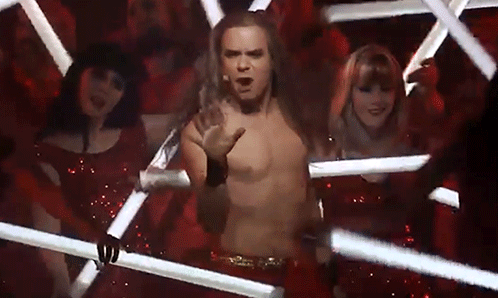

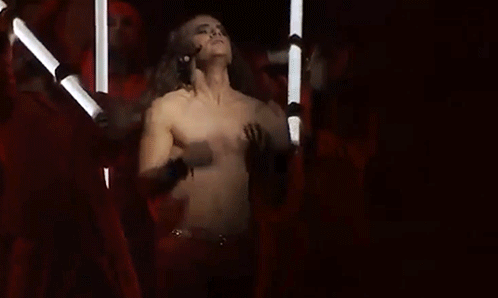
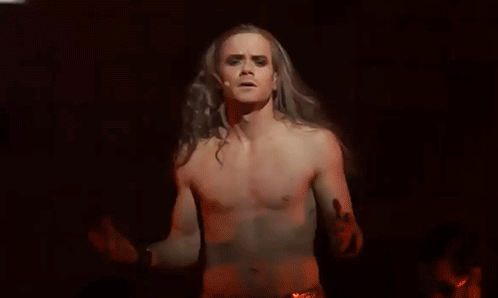


Peter Johansson as Judas in Jesus Christ Superstar (Swedish Arena Tour 2014)
jag vill bara ha ett svar---
är du den som du sa?
#peter johansson#jesus christ superstar#jcs#jesus christ superstar swedish arena tour 2014#swedish jcs#swjcs#my gifs
36 notes
·
View notes
Text

#I am sooo normal about this musical I promise#jcs#jesus christ superstar#ESPECIALLY THE 2014 SWEDISH ARENA TOUR AGH#Mats speaks !#Theatre !
238 notes
·
View notes
Text

Due to the slight changes in the lyrics of the plot of the 2014 version, I understand the story better and like it more. JCS always has a charm that makes me want to watch all versions. Unfortunately, I cannot find some versions.
#jcs#jcs 2014#jesus chris superstar#jcs fanart#fanart#Ola Salo#jesus christ superstar Swedish arena tour
22 notes
·
View notes
Text
the rizz chart
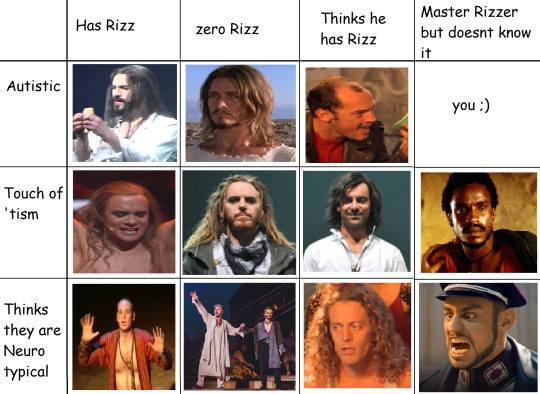
with @judasiskariotapologist
(We are open to input)
#jcs#jesus christ superstar#swedish jesus christ superstar#jesus christ superstar 1973#jesus christ superstar 2000#jesus christ superstar 2014#jesus christ superstar 2022#jesus christ superstar 2012 arena tour#ola salo#tim minchin#jcs 2014#jcs 1973#jcs 2000#jcs 2012
91 notes
·
View notes
Text
i think ola salo jesus is the most accurate jesus to me personally in the sense that he's just some guy doing weird shit getting pushed around in a shopping cart but at some points he just makes that messiah™ face and it's fucking terrifying dude he was literally just now a regular dude and the next second he turns into the first thing you see after you die
#AND YET !!!! he never has that messiah attitude once in gethsemane. which is very important. cause gethsemane is peak fully human jesus#moment. but shit dude fucking vampire looking divinity personified all powerful ass dude. he scares me.#i ❤️ swesus#jesus christ superstar 2014 swedish arena tour#as i've said before. he put his whole dalarnussy into that role
25 notes
·
View notes
Text
gonna conclude pride month by watching the 2012 broadway revival of jcs
#jesus christ superstar#ive seen the 73 version three times#the 2012 arena tour twice#the 2014 swedish one once#and ive had to have watched the 2000 one at LEAST five times#all in the same month btw
11 notes
·
View notes
Text
What a shame that i am not able to rewatch jcs this eastern
#:(#jcs#hope yall are having fun tho#jesus christ superstar#also for anyone who didnt do it yet WATCH THE SWEDISH 2014 ARENA TOUR i am begging you
2 notes
·
View notes
Note
May I request that Jesus Christ (specifically from the 2014 Swedish production of Jesus Christ Superstar) be blended?
Jesus from Jesus Christ Superstar (2014 Swedish Arena Tour) is being blended!!

You cannot save him.

#(jesus christ superstar swedish production was not something i even thought i would have to type)#(and yet here i am)#your fave is being blended#you cannot save them#blend requests#jesus#jesus christ superstar#jesus christ superstar swedish arena tour
81 notes
·
View notes
Text
jesus from the 2014 jesus christ superstar swedish arena tour is bisexual (canon)
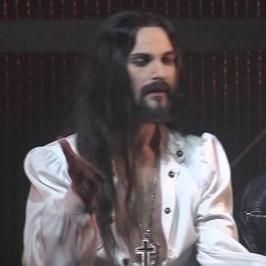

submitted by anonymous
#jesus christ superstar swedish arena tour#jcs#jesus christ superstar#jesus#jesus christ#bisexual#bi#mlm#achillean#bisexual characters#bi characters#lgbt#lgbtq#lgbtqia#lgbt+#lgbtq+#lgbtqia+#queer#queer characters#lgbt characters#submission#ask#your blorbos are queer
53 notes
·
View notes
Photo




JESUS CHRIST SUPERSTAR
2014 | Swedish Arena Tour
#jesus christ superstar#jcs#jcs sweden#judas iscariot#jesus christ#musicalgifs#musicaledit#jcsedit#mai gifs#okay this bit is driving me INSANE#also omg is that simon kissing another guy in the background in the second gif#maybe i'm just seeing things
100 notes
·
View notes
Photo

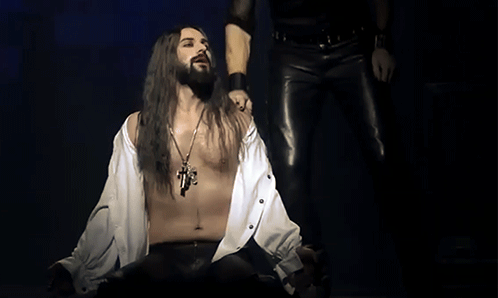

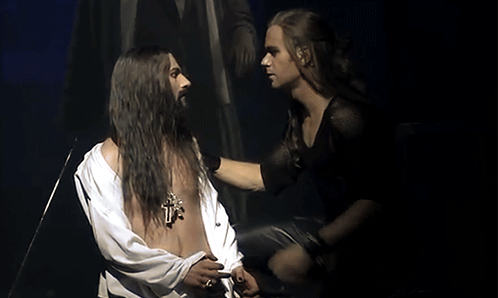
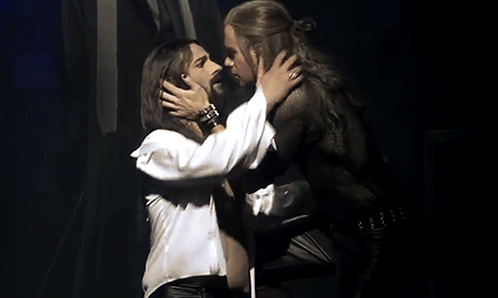
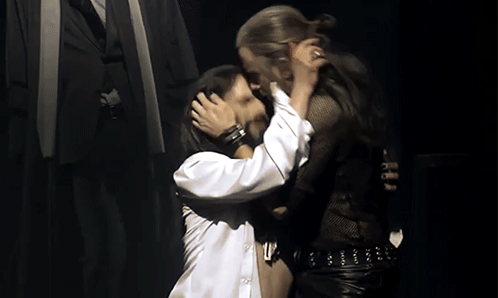
Jesus Christ Superstar (Swedish Arena Tour 2014)
hur visar jag min kärlek?
allt jag vill är att vara nära
#jcs#jesus christ superstar#swedish jesus christ superstar#peter johannson#ola salo#swjcs#my gifs#merry bisexual birth of jesus#these bitches be gay#and i feel normal about it
89 notes
·
View notes
Text
I finally watched Swedish Christ Superstar
Remember how I did a whole deep dive into the 2018 one? Yeah well, I was gonna try to do that with this version, but it is so unbelievably, completely, utterly, insanely unhinged that I just had to have my post about it match the energy. So without further ado, here are my literal first reaction notes to Jesus Christ Superstar (2014 Swedish Arena Tour).
Overture-
• Ooh the stuttering guitar is so metal
• Love the outfits, give me more apocalyptic leather headbanging nonsense
• Love how the choreo goes with the music rather than pure immediate chaos
• Admittedly the orchestra could be a bit better, but not terrible
• The shopping cart is my favorite character
• This feels almost interpretive
• Ok. Jesus is hot
• Draculacore
• Is he orgasming?
• I think that's an appropriate tone to be set
• I will say, I like productions with more color, but I see the style they're going for and I don't dislike it
Heaven on their minds-
• I like how they translated the lyrics to sound good in Swedish
• Also gives extra context and connotation to the words
• Love judas' mesh top!
• Really good singer wow
• This is how the song is supposed to be sung!!!
• I like boys with long hair hehehehe
• Symbolic that jesus is sleeping while judas is trying to get him to listen. Shows how closed off and resigned to his fate he was
• And also how no matter how hard judas tried he would never really be heard
• Painted nails!
• The subtitles said fuck? Lol
• I seriously love this guy's voice
• Oh my god they're so boyfriends
What's the buzz/Strange thing mystifying-
• Jesus is serving so much cunt
• So. Much. Touching.
• AHAHAHAHAGSVSBAZHDVWH THEYRE SO BOYFRIENDS HWWGGA
• Yes Maria feed him that orange
• "A man like him" you mean... 💅?
Everythings alright-
• I really like Mary's voice and look
• Mommy vibes fs
• He's in the shopping cart hhahahaha
• The masculine urge to sleep in a shopping cart while wearing shades
This jesus must die-
• Caiaphas sounds like a toad LMAO
• "It's seduction! It's blasphemy!" -Christians watching this 😭
• Caiaphas saying "STOP" such a jumpscare
• They kept the jesus is cool line and for that this is now one of my favorite productions
• AND THEY SAID IT TWICE AM I IN HEAVEN??
• Well I won't be after watching this 😌
• Caiaphas has a pretty cool voice ngl, my timbers are shivered
• HELIKOPTER 🚁 HELIKOPTER 🚁
Hosanna-
• A bit faster rendition that's neat
• Interesting how judas is participating in the fray
• It's so nice to see his character happy for once though
• The jesus balloons are killing me
Simon zealotes/poor jerusalem-
• Ooh it's a fight
• The ladies are sangin and dancin 💃
• THEY SAID FUCK AGAIN
• Well okay I'm just gonna give up on the notion that this play will be family appropriate in any manner, it's better that way anyway
• Pretty cool how the choreo is militaristic, as well as the costuming
• They way Simon is pronounced 😃
• I am unilingual my brain is incapable of not making a joke about that
• Jesus your nail polish is chipping baby fix that
Pilates dream-
• Love pilates robe, very pretty
• Ok but the sparkly suit is better
The temple-
• Fuck counter: 3
• They have a bit more speaking in this version which I really don't mind
• The lyrics make it really clear how the crowds used their connection to God to justify their actions, an issue which is still prevalent today
• Annas shaking that tail go off
• Jesus jumpscare
• He called it "A whorehouse" 💀
• The beggars all have little hand lights, that creates a really cool effect
• Wow the music got really fast
I don't know how to love him-
• Yayy Mary hi Mary hi 😍🥰👋
• Da smoochy???
• Judas ain't gonna be happy bout this
• Her voice is so good!!
• Interesting how jesus is awake for this
• ITS JUDAS HE'S PEEKING
• Uh oh
Damned for all time/blood money-
• OH NO
• MY BOY GOT SLAPPED
• HE JUST WANTED A SMOOCH
• Ok now it just feels like he's betraying him cause he got rejected 😭
• Annas is such a little shit oh my god
• He's giving Draco Malfoy vibes somehow
The last supper-
• Act 2 baby here we go
• Okay so he's dragging them to absolute hell, love that for you jesus
• The girls are FIGHTING!
• "Tell us what happened to the good vibes" I'm loving this translation
• Judas actor once again killing it, he has a really lovely rock voice
• The apostles throwing shade at judas and planning to blame him in the gospels 😙🤌
• This shit crazy
Gethsemane-
• Ok I'm gonna try to be serious for this once
• So far pretty good
• The lyrics are hitting the important parts of the song I feel
• HE GOT THE NOTE!
• Pretty damn good
• My bias still lies with Neeley but that wasn't gonna change really
• I like how he made the g5 actually part of the song rather than separating it. This whole performance is actually very natural and easy to watch
• The last verse goes so incredibly hard
• *rips shirt open*
• 👌
The arrest-
• Here it is the kiss
• Here we go
• Literally the only part of this play I'd seen before
• Okay that's just. So romantic. JESUS kissed JUDAS! What a twist!
• "Why did you date a whore" goddamn
Peter's denial-
• Annas is basically the main character he's in so many songs
Pilate and christ-
• "Yeah we know you're 'hot'" I mean 😏
• Fuck counter: 4
• My notes are seriously lacking I apologize
King herods song-
• Herod is me I am Herod
• Me in my robe on a Monday morning imposing judgement onto others:
• Did they just use a slide whistle?
• Goofy ahh sound effects 💀
• "Fine I'll do it myself- look, no hands 😚"
• He's my favorite
• Herod being silly and goofy:🤪
• Jesus: 😐
• Loved that
Could we start again please-
• Fuck counter: 5
• Not the song I expected it to be in tbh
• Maybe it doesn't hold the same weight in Sweden
• "How are we going to explain it so it looks good on paper?" This is a new angle that is actually really interesting, and reminds me that the Bible is pretty much ancient RPF
• Yay they included the ensemble
Judas death-
• "For one measly kiss" I'd call that kiss a lot of things but measly does not come to mind
• He is talking to jesus instead of christ
• Something tells me this production is not very religious 🤔
• Which I am very ok with
• He's goin through it
• He's got the rock screams going on 🤘love it
• RIP Judas, too gay to live 😔
Trial before pilate-
• He called Jesus a clown, bitch this isn't Godspell
• Ouchie
• That's a lot of blood
• It's easy to overact in the role of pilate and this guy isn't doing that, which is good
Superstar-
• I prefer when Judas is wearing white in this song, but the glittery red robe kinda slays ngl
• And once again judas is a pretty boy
• They kept the "jesus christ, Jesus christ, who are you what have you sacrificed" line in English
• Oop the robe is off
• Get those dance moves judas damn
• This is insane
• What is happening
• Why am I turned on
John 19:41-
• Ooh this is rather scary
• The way its literally just him on stage suffering is pretty intense
• IT IS FINISHED
Hope you enjoyed sluts
#jesus christ superstar#jesus christ superstar 2014#swedish christ superstar#jcs#jcs 2014#unhinged#i'm definitely ok what are you talking about#chaos#first reaction
51 notes
·
View notes
Text
Do you love musicals, too? You're in luck. The entire Swedish arena tour of Jesus Christ Superstar from 2014 is on Youtube!
The musical, famously written by Andrew Lloyd Webber and Tim Rice in 1971, was translated into Swedish as early as in 1972 by Swedish poet Britt G. Hallqvist. Agnetha Fältskog from ABBA played Mary Magdalene in the original Swedish stage version.
In 2008, Swedish singer Ola Salo re-translated and starred in a new stage version of the musical, that was played 2008-2009, and then again 2012, and lastly going on tour later in 2014. In 2022, he starred in another Swedish arena tour of JSC, this time as Judas, with singer Peter Jöback, of Broadway fame, playing Jesus. This time, however, the musical was performed in English.
Here you can enjoy the musical in it's entirety, all in Swedish!
youtube
youtube
#swedish music#swedish#jcs#ola salo#musicals#jesus christ superstar arena tour#sweden#svenska#00's#10's#jesus christ superstar#Spotify#Youtube
8 notes
·
View notes
Note
please drop the essay length analysis Judas and Jesus (extra gay Swedish edition), O great and knowledgeable monarch of our times
alright, you ask i deliver! please excuse any typos, my eyes aren't exactly working rn
welcome to my probably super subjective but correct analysis, aka
Judas Was Right and Jesus Was A Victim (At Least, In Swedish)
Before we get started, a couple points: i’ll try to avoid comparisons to other specific productions, i’ve only seen the other recorded 2012 british version which i didn’t like for reasons including but not limited to the amount of white people with dreadlocks. Also, my understanding of swedish is limited to a couple words and phrases, so most of the lyrics i reference will be english subtitles from Ola Salo’s swedish translation and therefore might not be the most accurate !
There’s so much i could cover in this, but for now i’m going to focus on how jesus and judas are portrayed in the 2014 swedish arena tour of Jesus Christ Superstar (JCS) starring Ola Salo as Jesus and Peter Johansson as Judas, along with how this production more implicitly views god.
From the opening number, translated into swedish as En Dimmig Himmelsdröm (A Foggy Heaven’s Dream), Peter Johansson’s acting and semantic differences in the lyrics present us with a deeply sympathetic portrayal of Judas. Looking purely at language, the english equivalent Heaven On Their Minds instantly paints Judas as much more of a faithless doubter- lyrics exclusive to the english version like “all your followers have gone blind / too much heaven on their minds” and “they think you’re the new messiah / and they’ll hurt you when they find they’re wrong” strongly enforce Judas’ main motivation for his actions being that he has less belief in Jesus and God’s plan than any of the other disciples with strong statements judging the other disciples for following him and claiming that Jesus ISN’T the messiah. The swedish translation doesn’t paint exactly the same picture- the focus of Judas’ number becomes his fear for Jesus’ wellbeing, not because he isn’t the messiah (the production remains fairly ambiguous on this point), but because Jesus can’t cope. The root of Judas’ concern comes from fear for Jesus’ wellbeing, and the disciples are referenced as regularly misunderstanding and wilfully twisting Jesus’ words. The swedish equivalent lyrics for the above examples are “they say, “jesus is god’s son” / but you know how people can change” (judas isn’t concerned with truth, just the danger that jesus will be in if the tide turns), and “the kingdom of heaven is within us, that’s what you said / bu they sew it, stitch by stich into some kind of foggy heaven’s dream”. Judas is showing that he HAS been listening and cares for Jesus’ teachings, but ‘they’ [his disciples] are turning them into something else entirely, and Judas’ worries that the support of the masses is fragile at best- the lines “and everything you say gets twisted by your lackeys / it will be anything but what you’ve said” and “you are being used by people who want you in their battle” reinforces this again. When combined with Peter Johansson’s tough but tender performance, in which he dances between disdain for Jesus, the institution, and affection for Jesus, the man (an important distinction), Judas is the harsh realist doing his best to look out for the man he loves. The way he takes Jesus hands and looks at him with love and urgency straight away establishes that his motivations are pure- Judas is doing what he thinks is best, even though it feels like no one will listen to him.
That was long, but En Dimmig Himmelsdröm is the perfect character introduction for Judas. He’s not totally unrecognisable, still delivering digs about ‘Jesus, the little carpenter’s son’, his manner is still rough and at this point we’re not sure whether or not the claims he makes about the disciples have any truth to them, BUT we can also see how much Jesus means to him, an important point that give context to the intensity of their future arguments and really makes the whole story much more heartbreaking.
This brings me to Ola Salo’s Jesus. Delightfully camp and queercoded, Judas describes him as being caught up in his own magic and mystery and buckling under the pressure, and he’s not entirely wrong. Throughout the first act, Jesus basks in the luxuries that being messiah can give him (the oils Mary paid for using disciple funds that were supposed to go towards helping the poor, him absolutely thriving in the shopping cart in What’s the Buzz?), and is shown actively avoiding any reminders of the seriousness of his position. He’s sick of the disciples asking him for a plan, he chooses the comforting Mary, who’s theme consists of telling Jesus everything is okay and he doesn’t need to think about anything, over Judas, who is less perhaps ‘cosy’ but is actively trying to warn and protect Jesus from an awful fate. During The Temple, he starts to crack as he’s overcome by the followers begging him to make him well, fear in his eyes as he raises his arms while frozen on the spot trying to avoid being devoured by the frenzy in desperate need of a messiah. Judas’ point about Jesus buckling under the pressure is starting to look more and more reasonable, and the dashes of showbiz campness add to the sense that much of Jesus is a persona constructed for the masses to give himself enough distance to prevent him from being crushed by the weight of God entirely. Jesus, the institution, prances around, lays his hands on his followers, and projects an air of easygoing calm. Jesus, the man, is scared and alone, and Jesus, the man, really comes out in Last Supper, but before we get there, I want to circle back to the Jesus/Mary/Judas thing.
Jesus, Mary, and Judas are presented as a love triangle: so much so, that Judas seeing Mary sing of her love for Jesus (I Don’t Know How To Love Him) is actually played as the inciting incident that sends him to the pharisees. Judas, the picture of the jealous lover, storms onto the scene, breaking them up and attempting to kiss Jesus, who instead shoves him to the ground in disdain. Judas, who is perhaps a little controlling, realises that any influence he had over Jesus has gone, and it’s likely a combination of jealousy and the knowledge that Jesus won’t stop that prompts him to head to the pharisees. In his meeting with the pharisees (known in english as Damned For All Time, although that phrase doesn’t appear once in the swedish), Judas’ expresses outright that “I’m the one who sees / Jesus, he can’t handle it anymore” “the truth is that this hysteria is making him lose control”, once he can get past explaining how much this plan of action feels like a last resort. He never even verbally or physically accept the pharisees’ offer of money, he denies it twice before it is eventually thrown over him after he reluctantly gives them the date and time to find Jesus- we never even see him pick it up, unlike other productions which show Judas grabbing for the cash and place a higher emphasis on Judas making sure he ‘won’t be damned for all time’, painting Judas as far more self serving. When it comes to Jesus, Judas is active- he’s running around trying to help, caressing him, embracing him, grabbing his hand, kissing him. They share countless moment of intimacy, especially at the start, establishing the fondness between them instead of instantly jumping to their conflict. When it comes to Mary (and admittedly, this is partially because she’s a secondary character- don’t get me wrong I still love her and Gunilla Backman does a brilliant job), she’s much more passive. Other than the much more gentle kisses in I Don’t Know How To Love Him and her penchant for dabbing Jesus’ forehead, she’s mostly just ‘there’. She cares for Jesus after the fact, and even when performing acts of intimacy like the oil and the kiss, she maintains a lot of physical distance- her songs touch on this as, much like Jesus (admittedly for different reasons), she actively distances herself from feelings to protect herself, so naturally she literally places distance between herself and the object of her love.
This brings me back to Last Supper, Gethsemane ( I Only Want to Say), and the kiss of death that broke all of our hearts. Throughout this segment, this is when Jesus, the man, really comes through, and it’s devastating. In Last Supper, he properly expresses the sheer amount of loneliness he feels, reiterating how he feels everyone will forget about him once he’s gone, and doesn’t really care about him as a man (”for you, my blood is not worth more than wine / for you, my body is not worth more than bread” “you will have forgotten me as soon as i give up my life”). This devolves into the disciples fighting each other and, you guessed it, ignoring him. For the first time, Jesus meaningfully lets out his anger, and as it turns to Judas, Judas does the same. Because of the set up of their complicated romantic relationship and the stakes involved, the amount of personal attacks and anger that comes out of Jesus and Judas’ repeated fights (which get physical) make complete sense- Jesus’ frustrations come from the fact that his entire fate has been predetermined and to him, Judas is just another instrument in the ways he’s been controlled (both with Judas being his betrayer, but also the way that Judas’ constant advice and interference with Jesus’ life (most obviously, the mary thing) are acted by Ola Salo as becoming increasingly frustrating to Jesus)- these frustrations are directed at their real cause, God, in Gethsemane. Judas’ frustrations come from the fact that no matter how hard he tries to help Jesus and keep him safe, Jesus keeps rejecting his efforts resulting in “all that we’ve built up [being] destroyed”- Judas’ heart hasn’t just been broken by Jesus rejecting him romantically, but on every level. Here, he’s actually shown to be the disciple most passionate about helping people practically and long term, being the only one concerned about Mary taking money which was supposed to help people, manipulated by the pharisees with the promise of doing good for the masses, and criticising Jesus for how they could be doing so much for people, ending his part of Last Supper with “every time i look at you i ask myself why you let all your things go so wrong? / all i ever wanted was to help you”.
This is also the point where Judas’ claims about the disciples are essentially confirmed, and this productions intent to portray Judas as more of a tragic hero become absolutely clear. In the english version, the disciples chorus remains virtually the same each time it appears, generally being far too calm considering their leader is about to die, revealing their aspirations to be apostles, and their intent to write the gospels to be remembered. the swedish translation still achieve this, but with variations from chorus to chorus it becomes much more poignant. i’m just going to stick to ttwo, which are choruses 1 and 3. In chorus 1, lines roughly translate to “i’ve always wanted to be an apostle / life is so nice when you’re saved/ then when we’ve got time we’ll write the gospels / then everything will be the way we want”- the apostles declaring that life is so good when you’re saved supports Judas’ opening statement that they care more about some idea of heaven than anything else, not to mention ignoring the absolute horrors that Jesus will have to go through to be saved, while the final line about the gospels introduces their intent to change whichever details they need to make ‘everything the way we want’: once again, exactly what Judas warned us of in En Dimmig Himmelsdröm. In chorus 3, taking place after Judas storms out for the last time, these lines change to “never really liked that judas / never saw what jesus saw in him / then, when we’ve got time we’ll write the gospels / and we’ll angle it so he gets all the blame”. Judas as a sympathetic character is confirmed here, as the disciples straight up admit how they don’t like Judas anyways and intend to write him as a villain (also inadvertently admitting that, since they have to write the gospels to make it look like only Judas’ fault, Judas isn’t really the sole one responsible for everything that is to come). It’s deeply unsettling, and for me was the point where I really began to question how good any of these disciples were, and by extension, how good is this production’s God if his truly sanctified followers are acting like this?
Jesus vents out all of his anger and desperation in Gethsemane. He acknowledges his own powerlessness and begs him to change the plan, but with the dark stage and no response (along with Ola Salo’s spectacular acting) it becomes clear that if anyone is there, they’re certainly not listening (”you, who have all the power / can you please change the plan / for i can already feel the pain burning in me”). It’s worth mentioning that a lot of the imagery in this swedish version is much more intense than the english, both in this song and the production as a whole. Jesus plainly calls god “thoughtless”, begging to understand, and it’s that this point we realise that he agrees with much more of what Judas has been saying than he’s been letting on- Jesus’ faith appears to be the only thing keeping him from listening to Judas and running away. Judas’ messages about people misunderstanding Jesus’ words also come out (”you care that everyone sees / but not that anyone understands”), and his eventual agreeing to die is played less as an inspiring act of faith, and more an act of desperation as he realises, he realise has no other choice. In this song, we see just how much of Judas Jesus has valued and taken on board, and that his air of carefree aloofness which frustrated Judas was, as we’ve already touched on, a complete act. The line “might as well finish what i’ve... what YOU’VE started” is absolutely miserable, reinforcing one of the major themes of this production: the idea that Jesus and Judas were both just ordinary men tormented by futures defined by forces out of their control. Just as Jesus has absorbed Judas’ logic, as an audience so we have, and it’s difficult to view the rest of the play’s events as anything other than an immense and unnecessary act of cruelty.
we’re almost done i promise!
Even knowing what Judas has/will do, Jesus still greets him with love. Judas, still under the impression that Jesus will be okay and that he’s doing what’s best, approaches him with the utmost tenderness, and the kiss is a beautiful signifier of two things. For Jesus, the return of his love for Judas shows his realisation in Gethsemane that Judas isn’t the one who’s sealed his fate and has only being trying to help, it’s god himself who has decided Jesus’ future. For Judas, the kiss shows that despite all of the anger and frustration that has been pouring out of him, he truly does love Jesus, and the way he cradles the scared and alone Jesus to his chest afterwards shows just how much he wishes he could be the one to help him and keep him close. Even with all their arguments and dysfunction, here Jesus and Judas find comfort in each other, and it almost seems like everything will end up alright. It’s in this moment that Judas and Jesus are most identifiable not as enemies, or as villain and hero, but as archetypal lovers from a Shakespearean tragedy. Neither of them set out to hurt each other, but through miscommunications, their own flaws, and external forces (both natural and supernatural), their love is simply never to be. Furthermore, in the following torture and spectacle, everything that Judas predicted for Jesus is about to come true. Another detail I find interesting is the way that Jesus and Judas both sport black nail polish, leather pants, and similar length hair: along with just looking cool as hell, the similarities really reinforce how close they are and how much they influence each other- it feels like a contemporary version of carrying a cameo or a lock of your lover's hair with you, a way for 'star crossed lovers' to keep a piece of their beloved no matter what.
The disaffected persona of Jesus, the institution, comes back as he’s taken by the authorities and subsequently insulted, degraded, and whipped. Also the swedish version of The Arrest, when the chorus starts singing questions, contains this dick joke and I think we all deserve it: “why were you dating a whore? / talk about a huge magic wand!”
Skipping forward to Judas’ Death, this is where both his character and the production’s conception of god beautifully (and miserably) align. When Judas runs to the pharisees, minor semantic changes (along with the genuine concern and great acting from Peter Johansson) reinforce that this Judas genuinely didn’t know that Jesus would be beaten and sentenced to death the way he has been, and Judas’ concern regarding how things look is played less as ‘oh no people will hate ME!’, but how having sentenced the man you love to death is one nightmarish thing, but for everyone to think you did it knowingly and willingly and then congratulate you for it is unthinkable. Where the english shows Judas’ attempting to evade responsibility for Jesus death, the swedish is more focused on Judas’ guilt, horror, and regret. The english “I’d save him all the suffering if I could / don’t believe our good / save him if I could” is swapped in swedish for “If anyone should die here I should / don’t say I’m good / better if I died”. While the english statements are somewhat empty (sure, Judas says he’d save Jesus’ suffering if he could, but he can’t so we’ll never truly know) and are still focused on Judas’ attempt to construct himself as a good guy, the swedish translation has Judas admit his guilt (even if it’s not really his fault), and make the promise of “better if i died” which, given the name of this sequence, he later delivers on. When english Judas sings “Christ, I’d sell out the nation / For I have been saddled with the murder of you”, swedish Judas sings “Jesus, I’ve been deceived / because of my act your blood’s now being spilt”, and instead of ending this first section with “I should be dragged through the slime and the mud”, swedish jesus returns to the theme of character assasination with “i will be cursed as the one behind your murder”.
The swedish translation of the next rework of I Don’t Know How to Love Him also places much more emphasis on Judas’ genuine romantic love for Jesus- we’d be here for hours if i listed everything but here are a few key contrasts. The english has Judas sing “I don’t know how to love him / I don’t know why he moves me”, whereas the swedish has Judas crying while singing “how do I show my love / all I want is to be close to you”. Along with acknowledging Judas already loves Jesus, the entirety of this segment is shifted from Judas singing about Jesus in the third person ‘he’, to a direct address. Judas isn’t performing his sadness, or venting his emotions, he’s emitting one last desperate cry to the man he loves as he sobs on a stage completely shrouded in darkness, and it’s devastating. Peter Johansson lets his voice run raw as he’s belting, and interrupts lines with sobs, and this Judas answers the question of “do you love me too? do you care for me?” with a quiet “no”- Judas is about to go to his death convinced Jesus must hate him, just as Jesus will face his knowing his love inadvertently put him there.
We finally reach Judas’ actual death, and the production’s far more ambiguous (if not negatively geared) depiction of god comes to a head. Judas’ screaming at god the moment he realises that his god essentially forced Judas to be the one to kill Jesus (an act of ultimate cruelty given their love) comes across as horrifying in it’s validity, unlike in other english language productions where it follows the more common characterisation of Judas being an unbeliever who can’t take responsibility for his own actions. When he spits on the ground, screaming “you have murdered me!”, we can’t help but agree- Judas was trying everything he could to stop Jesus from dying, and yet here he is. Most notably, Judas doesn’t set up his own suicide- a noose literally descends from the heavens, already tied, and Judas is literally trapped between the edge of the stage, and the symbol of death behind him. Much like he didn’t choose to kill Jesus, Judas has no choice in his own suicide- it’s suggested to merely be another part of the plan god has for him, and Judas raising his arms to form a crucifixion pose before he finally turns and jumps, disappearing into the depths of the theatre as the rope trails down (somewhat evocative of a leap to hell), highlight the sick joke. Much like Jesus begging in Gethsemane, a plea with god that in anyway implies fault or cruelty is met with silence followed by a death sentence.
When Judas reappears to the broken and bloodied Jesus in Superstar, he appears as more of a twisted hallucination than the literal spirit of Judas. He’s the opposite of everything he was in life, draped in colour, surrounded by red lighting instead of the signature blue, his hair quite literally let down, joking and dancing. Despite singing about him, Judas virtually ignores Jesus for the whole song except when he’s taunting him, snatching his hand away after a broken and desperate Jesus reaches out for the image of his beloved (refuting Judas’ belief that Jesus would die hating him), along with the swedish additions of Judas repeatedly addressing him as “little Jesus”. Where the living Judas was serious, sometimes harsh but always well intention, often paying more attention to Jesus than he received, this Judas is the opposite: light hearted but cruel, not caring about Jesus one bit. It’s somewhat an inversion of the beginning of JCS, where the tormented Judas was constantly reaching out to Jesus, and often met with scorn and insult (see: most of their arguments, this line from Everything’s Alright: “the thought is beautiful but quite unrealistic / yes, even quite stupid”). As the song goes on, and even as Jesus is crucified, the victorious scoring of the Superstar theme ends up reinforcing the cruelty and questioning of god distinctive of this production: Ola Salo’s Jesus is one of the bloodiest Jesus’s (Jesii?) I’ve been able to find, with blood covering his torso, his arms, and all over his face, not in passive dribbles, but violent ‘swooshes’ spreading out from his eyes, emphasising the fear and pain contained within them. As the music suggests how great and wonderful Jesus’ death is, the images straight out of a horror movie before us don’t seem to match up: as both Judas and Jesus question, if no one is understanding what Jesus is saying, why kill him? instead of making a point, you’re ensuring that the falsehoods continue to circulate, unless spreading the true message isn’t really the intent at all. or, simply that Jesus was wrong: his interpretation and teachings of god were far too kind and practical, and the true god really is the one that he briefly saw in the garden of Gethsemane, and that Judas saw before his death- a cruel and vindictive god using them for his own sick purposes. If you're a strong Christian, I'm sure you could watch this production and still believe that God was right (although I think Jesus and Judas being in love counts as blasphemy), but I think in doing so you'd lose part of what makes this production so hard hitting and, as i keep saying, devastating.
that’s pretty much it for this one! i feel like jesus and judas as a queer couple is less significant to this production than the fact that it’s specifically jesus and judas that are in love - they don’t face explicit homophobia as such, although i do think the paratextual and historical associations of queerness (both with them each looking visibly queer, and them as a couple) adds a beautiful dimension by subverting the standard christian teaching of Jesus’ sacrifice as “a love that changed the world” and making the love that truly could have been transformative (and was, to a degree) the love between Jesus and another man, not to mention the way in which queerness is often viewed as radical perfectly upholding the ‘radical’ views of god and the story of Jesus shown in the production. Why wouldn’t the love between two men be the love which has us questioning god, faith, and that which many of us have been taught since birth? Ola Salo has talked about how he’s able to be positive and negative towards christianity, along with how he wanted Jesus and Judas to really represent two sides of the same coin (’faith and intelligence’), and being bisexual along with having alluded to being raised christian (not to mention Breaking Up With God, a song by his band The Ark), it’s not surprising he’s managed to present such a nuanced and layered interpretation of Jesus Christ Superstar that even me, a trans exvangelical, can fall in love with.
UPDATE: @bands-and-hobbits has just let me know that Ola's dad was a priest! Apparently he's said that he liked the organs and the music, but that was all when it comes to christianity, which (when combined with Ola stating in interviews that the JCS soundtrack has been one of his favourite albums since he was 14) makes a lot of sense about the level of familiarity he had with the text giving him confidence to go in and make changes to really capitalised off of some of the themes that are hinted at in the english version- you have enough information to understand how everything works together, but aren't so dedicated to preserving belief that you feel you can't improve/change things (and my god are we glad he did)
#thank you if you made it this far!#also the inherent rhythm in swedish as a language just makes all of the songs sound better i'm gonna say it#english is really hit and miss when it comes to music and can get especially clunky with musicals requiring exposition#also sorry there's so much i've left out !#anyways enjoy#jesus christ superstar#jesus christ superstar swedish arena tour 2014#jcs#peter johansson#ola salo#also i have barely edited this so i hope it's coherent
138 notes
·
View notes
Text
"well done judas....

...good old judas"
#judas jcs#judas#jcs#jesus christ superstar#swedish arena tour#swedish arena tour 2014#swedish arena tour jcs#jcs fanart#jesus christ superstar fanart#fanart#art#musical fanart#digital art#barrel of screaming arto vera⭐
107 notes
·
View notes
Text

@mahlowes , here you go!
Let me tell you what work it was finding 9 different versions of JCS to pull from lol
(from top left, going left to right)
Glenn Carter (JCS 2000)
Steve Balsamo (JCS 1996)
Ola Salo (JCS 2014 Swedish Tour)
John Legend (JCS 2018)
Ian Gillan (JCS 1970)
Ben Forster (JCS 2012 UK Arena)
Ted Neeley (JCS 1973)
Paul Alexander Nolan (JCS 2012 Broadway Revival)
Beto Cuevas (Jesucristo Superestrella)
#jesus christ superstar#jesus#my handmade memes#jcs 2000#jcs 1996#jcs 2014#jcs 2014 swedish arena tour#jcs 2014 sweden#jcs 2014 swedish tour#swedish jcs#jcs sweden#jcs 2018#jcs 1970#jcs 2012#jc 2012 uk#jcs 2012 uk arena#jcs 2012 uk arena tour#jcs 1973#jcs 2012 broadway#jesucristo superestrella#glenn carter#steve balsamo#ola salo#john legend#ian gillan#ben forster#paul alexander nolan#beto cuevas
124 notes
·
View notes